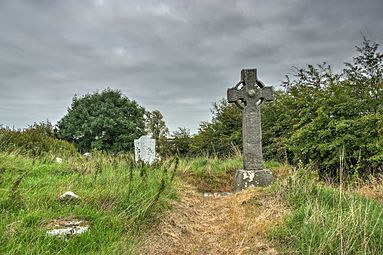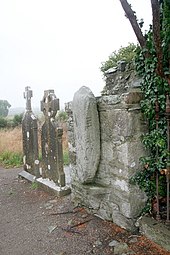Castlekeeran
Location
Castlekeeran survives as a walled graveyard, 1.1 km (0.68 mi) south of Carnaross and on the south bank of the Leinster Blackwater.
History
Castlekeeran was founded by Ciarán the Pious of Bealach-duin (died 14 June 770). The monastery was raided by Vikings in 949 and by Diarmait Mac Murchada in 1170, before passing through the hands of the Knights Hospitaller and in after the Dissolution of the Monasteries to the Plunket family.
Description
High crosses
Three sandstone high crosses are on the site. A fourth cross is in the river. According to legend, Columba was stealing the cross, was caught by Ciarán and quickly dumped the cross in the river. They are called termon crosses (from the Irish tearmann, "border") which marked the sānctissimus, the holiest part of the monastery around the church.
- Castlekeeran
-
South Cross
-
West Cross
-
Ogham stone
Ogham stone
An Ogham stone present reads COVAGNI MAQI MUCOLI LUGINI, meaning "Cuana son of the people of Luigni." The Luigni were noted in Meath from the 8th century onward, and give their name to the barony of Lune.
References
- ^ McLaughlin, Barney. "Castlekieran - Irish High Crosses - Barney McLaughlin".
- ^ Andrew Halpin; Conor Newman (2006). Ireland: An Oxford Archaeological Guide to Sites from Earliest Times to AD 1600. Oxford University Press. pp. 278–9. ISBN 978-0-19-280671-0.
- ^ "Megalithomania.com".
- ^ "Castlekieran, County Meath".
- ^ Past, Ed Hannon-Visions of the (13 April 2013). "Castlekeeran Monastic Site, Meath, Ireland".
- ^ "Castlekeeran Ogham Stone".
- ^ "The Baronies of Ireland - Family History".
- ^ "Castlekeeran Ogham Stone".
- ^ "ME02209 - CASTLEKEERAN - Ogham stone". MeathHeritage.com. 6 December 2012. Retrieved 30 July 2021.


